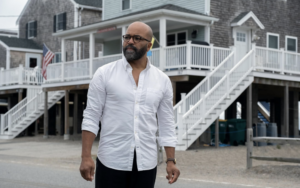America’s cultural mood calls to mind a bunch of people tentatively peering out from their hiding places in the aftermath of a torrential hailstorm. Is it over? Can we come out now? Are we still cancelling each other to death, or has the vibe finally shifted?
In recent months, people who lost their jobs amid this or that spasm of ideological intolerance have begun to reappear in places where they would have been previously blackballed, telling stories that sound like modern-day versions of The Crucible, except much stupider. The memoir of #MeToo hero Christine Blasey Ford was released last week to surprisingly little fanfare, while a NYMag exposé of womanising podcaster Andrew Huberman — which only a few years ago might have resulted in the boycotting and deplatforming of the man in question — made barely a dent in the discourse. Brands that went all in on social justice are now quietly — and in some cases, desperately — distancing themselves from the excesses of the era. Even the painfully hip young progressives who run Biden’s social-media channels have stopped using inane terms like Latinx, and resumed posting like normal people, or close enough.
And yet, there is also a sense that we cannot pull back from the edge, particularly in the rarefied spaces where high culture is made. Consider this month’s imbroglio at the literary journal Guernica, which lost virtually all its volunteer staff in a wave of mass resignations following the publication of an essay by writer and translator Joanna Chen. Titled “From the Edges of a Broken World”, it described Chen’s complicated and conflicted relationship with her adopted country of Israel — to which she immigrated at the age of 16 after the death of her brother — in the wake of the October 7 attacks that left 1,400 people dead, and the retaliatory bombing by Israel which augmented that number by tens of thousands more. Within days of the essay’s publication, Guernica‘s co-publisher and nearly a dozen editors announced that they were resigning in objection, accusing Chen of trying to “soften the violence of colonialism and genocide”. The magazine unpublished the essay with apologies, although apologies for what remains unclear; a “more fulsome explanation” for the retraction was promised but has yet to appear, and the magazine’s website has not been updated in weeks.
It’s hard to understand how someone could read Chen’s words and see a woman who is “speaking for power”, and blind to the plight of the Palestinians, let alone defending genocide. “There is a limit to which the human soul can stomach atrocities and keep going,” she writes, in a paragraph that mentions both the October 7 slaughter by Hamas terrorists and the ongoing massacre in Gaza. The essay, which has since been republished by Washington Monthly, is interspersed with lines of poetry by Palestinian writers, people Chen knows personally from having translated their work, and also describes her ongoing work as a volunteer driving Palestinian children to Israeli hospitals. But of course, most of the essay’s fiercest critics didn’t read it, at least not comprehensively — and of course, not reading it was exactly what they wanted everyone else to do. That’s the thing about censors: they don’t really care what you’re saying. They just want to stop you from saying it.
In truth, the most interesting thing about Guernica‘s collapse is how familiar its contours seem. The substance of the controversy changes, but its shape remains the same. There was the cherry-picking of one allegedly offensive line — in this case, Chen grimacing as a friend tried to comfort her children by describing the sounds of rocket fire as “good booms” — which was then repeated ad nauseam, like a magic password that allowed critics to condemn the essay while bypassing any actual engagement with its content. A search for the phrase “good booms” on X is an illuminating, if depressing, reminder that what you cannot bring yourself to read charitably you will also inevitably struggle to comprehend — and that even the most literate among us are not above pretending, for the sake of tribal signalling, to have the intellectual capacity of a turnip.
But of course, this was just step one; eventually, and particularly if a backlash has begun to brew, the censors will pivot to a litany of secondary indictments: a lack of oversight by the editor (“A rigorous editorial process might have produced something worth reading!”), an error in the publication process (“Only one editor saw it!”), the quality of the censored work (“It’s not even good!”).
For those of us who come to these debates based on a sincere and principled commitment to free expression, this rhetorical barrage is disorienting; it’s like being invited to a scrimmage only to find your opponent repeatedly picking up the goalposts and carrying them all over the field, jeering at you over their shoulders for wanting to play in the first place. It would be almost hilariously bewildering, if it weren’t so damned bleak. The journal editors who are supposed to be the custodians of the literature that allows us to know ourselves, our world, and each other — people who spend their lives bewailing the dangers of book bans from the Right — become a pack of sneering authoritarian bullies when confronted by work that dares to empathise with anyone but their chosen side. The artists who are supposed to be our truth-tellers, our rule-breakers, whine that a story wasn’t subject to proper editorial process, like a snotty bureaucrat sending you to the back of the line because you didn’t properly fill out Section 320A of Form 981 at the DMV.
It doesn’t matter if the story was good; it doesn’t even matter what the story was about. Anyone who cares about art, and especially the ones who care about it enough to make it, knows this for the cringing, callow conformity it is. It is — or at least, it should be — utterly beneath us.
A common criticism of Israel is that, in its treatment of the Palestinians, the country has become the thing it once hated. This seems too facile to adequately describe the complexities of a conflict thousands of years old, in which all parties involved have suffered, and struggled, and spilled the blood of others as surely as others have spilled their own. But it could perhaps describe the current state of the arts in America, in this moment of absolute hegemony by the Left in every place where culture is produced — and in which the flag of the progressive cause can be found literally flying over everything from corporate headquarters to the White House.
We call this a “culture war”, but in truth, it feels like that war has been over for some time, and that the Guernica controversy is just the latest flex by a regime that has been in power for over a decade. Consider how long we’ve lived in thrall to the shrieking, puritan mode of cultural critique first advanced on the Your Fave Is Problematic Tumblr. Consider how long we’ve been policing books and films for “harmful tropes”, or obsessing about the racial makeup of the Oscar nominees. Consider that it was 2017 when progressive folk hero Roxane Gay effectively torpedoed HBO’s Confederate, an alternate-history drama led by Game of Thrones showrunners David Benioff and D.B. Weiss, by calling it “slavery fanfiction” in the pages of the New York Times.
I often think about Confederate. Who knows: maybe the concept was, if not slavery fanfiction, too flawed to pull off. Maybe it would have been in truly bad taste. But maybe it would have been interesting, or provocative, or even great — and we’ll never know.
This, too, is the thing about censorship: at its worst, it isn’t just about one book, one film, one painting going up in flames. At its worst, it yanks the paintbrush from the artist’s hand before he’s painted a single stroke, all for fear of what he might create. It’s why, even now, it still seems so strange and terrible to me that so many of these avid censors are often artists themselves. The one-time counterculturalists who overthrew the scolds of the Moral Majority, ascending into power through the sheer audacity of their art, their stories, their songs — how long did it take before these same people started using their newfound influence to silence the voices of the artists they didn’t like? A year? Five years? Was it always going to be thus?
Maybe. What matters, I think, is that we are fully living on the other side of that moment, and have been for a while. The spasms of the past few years, whatever you want to call them — wokeness, cancel culture, something else — were not a power struggle, but the aftermath of one: the part where the winner shows his strength and supremacy by stamping his boot on the faces of the losers, not forever, but certainly until everyone knows exactly who’s in charge.
Seen this way, what happened at Guernica is simply what has been happening. Not a revolt from below, but a reminder from above of who holds the power, the influence, and the censor’s pen in their hot little hands. That Guernica has published nothing since the meltdown over Chen’s essay seems less like accidental fallout, and more like things going exactly as planned.
Disclaimer
Some of the posts we share are controversial and we do not necessarily agree with them in the whole extend. Sometimes we agree with the content or part of it but we do not agree with the narration or language. Nevertheless we find them somehow interesting, valuable and/or informative or we share them, because we strongly believe in freedom of speech, free press and journalism. We strongly encourage you to have a critical approach to all the content, do your own research and analysis to build your own opinion.
We would be glad to have your feedback.
Source: UnHerd Read the original article here: https://unherd.com/



